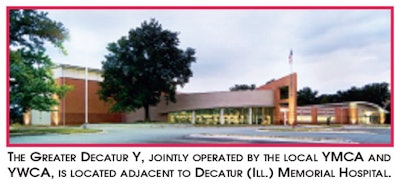YMCAs form partnerships despite IHRSA outcry

Everywhere you look, the battle between for-profit health clubs and public recreation agencies is getting uglier. This fall, a group of out-of-town business owners filed a lawsuit to prevent Coatesville, Pa., from building a municipal golf course. In Utah, a state with 60 for-profit health clubs, the 2003 Legislature has formed a Tax Review Commission that is considering possible formulas in which the state's 29 municipal recreation centers deemed to be in competition with a local club would be taxed on competing activities, such as weightlifting, aerobics classes or climbing walls.
Even with the International Health, Racquet & Sportsclub Association ramping up its legislative efforts against public recreation centers , tax-exempts continue to find themselves in the crosshairs, too. In September, a group called Citizens Against Government Waste issued a report, "From Community Service to Community Disservice," that charged the YMCA of the USA with benefiting from an unfair tax advantage. In Greenville, S.C., a group of local clubs banded together as the Coalition for Healthy Competition to fight Greenville Hospital System's plans to build two fitness centers. And in Bellingham, Wash., grumbling (although no litigation) from club owners has accompanied the September opening of Western Washington University's new $26.7 million, 100,000-square-foot campus recreation center.
The response to all this among the tax-exempts has long been to a) shrug and b) form partnerships with other beleaguered wellness providers. Business as usual, says Audrey Haynes, the YMCA of the USA's national director for government relations and policy.
"We have tried for years to build healthy spirits, minds and bodies," Haynes says. "We were founded on that triangle, and we've been doing it for more than 100 years. So really, nothing has changed with us. We're continuing to meet the needs of communities."
One such community is Jamestown, N.Y., where a partnership was forged this summer between Jamestown Community College and the Olean Family YMCA. The college will have a 25 percent ownership share in a planned $8.5 million, 62,000-square-foot athletic complex, which will include a competition gymnasium, locker rooms and athletic offices wholly owned by the college. Jamestown students will also enjoy use of the Y's natatorium, fitness center and other amenities. It's an arrangement that will give the college what amounts to a campus recreation center for at least the next 30 years (the length of the initial lease agreement) - all for a cool $2.2 million.
Although there has never been such a partnership that was not portrayed by its participants as "win-win," many club owners view these sorts of deals as a losing proposition. For instance, Cathy Buckley, owner of the Bellingham Athletic Club, told the Bellingham Business Journal that losing a high percentage of her 140 Western Washington University student members - 6 percent of her club's membership - would be the difference between making a profit and breaking even.
Organizations such as the Y, however, view partnerships as an opportunity to satisfy their mission and, perhaps not coincidentally, to score an impressive public-relations coup. A recent example involves the South Shore YMCA in Quincy, Mass., which (coincidentally) was singled out in a vitriolic IHRSA publication a few years back titled, "Winning the War." This past June, with the local and national economies in the tank, South Shore convened a meeting with mayors, city and town councilors, selectmen, and planning board and school committee members from seven jurisdictions to discuss ways in which the Y could help them provide recreational services. As D.J. MacKinnon, chair of the South Shore Y's public policy committee, told The Boston Globe at the time, "They may have playing fields they need to maintain. We may be able to run a soccer or tee-ball program. We often can link a city or town to private and corporate support."
The Y's offer was greeted warmly by cash-strapped officials, who described it as being in line with the Y's other offerings - including a children's literacy program, day care and summer camps, and a physical therapy program offered at the Y for individuals who are not covered by health insurance.
The South Shore YMCA, Haynes says, is her answer to IHRSA in a nutshell. "IHRSA generalizes our facilities as fitness centers, which means they aren't very educated about everything that goes on in them," Haynes says. "Other people may see what we do as competition, but with the health-care crisis we have in this country, we say, 'The more the merrier.' "




































